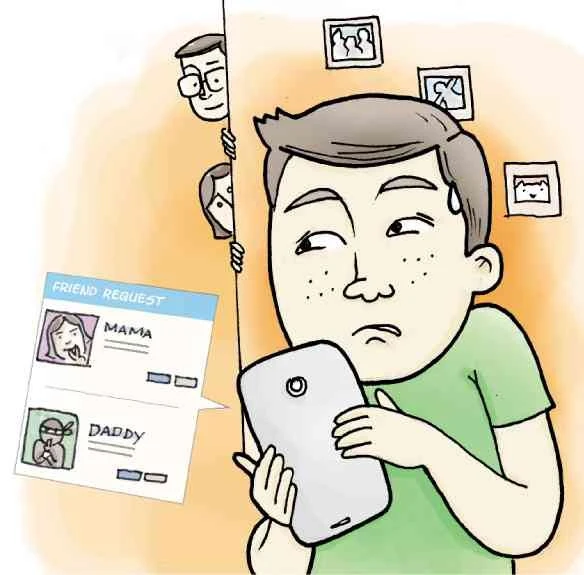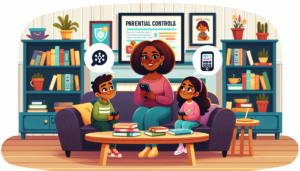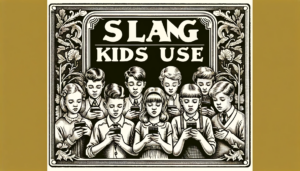Key Takeaways:
- Interact Sparingly: Engage with your teen’s posts with discretion. An occasional like or comment is fine, but avoid frequent interactions that can embarrass your child or feel overbearing.
- Be a Silent Observer: Resist the urge to publicly address your teen’s oversharing. Instead, monitor their activities quietly to stay informed and understand their social dynamics better.
- Address Issues Offline: Confront sensitive topics like inappropriate posts or cyberbullying in private. This approach preserves your teen’s dignity and allows for open, constructive family dialogue.
- Highlight Digital Footprints: Remind your teen that their online actions have long-term implications. Encourage them to consider how their posts might impact future opportunities or aspirations.
- Use Social Media Positively: Emphasize the benefits of social media, such as keeping in touch with distant family and friends. Promote it as a force for good and a tool for bringing your family closer.
“Mom, that’s so embarrassing! I can’t believe you posted that cheesy comment to my profile picture!”
Sounds familiar? Social media is a relatively new phenomenon, and for many parents, it’s hard to determine proper etiquette. How often is it okay to participate in your child’s online interactions? Do you intervene at signs of trouble? Is it okay to send friend requests to your teen’s peers? Want to avoid being “that parent?”
5 tips to be social media savvy when it comes to your teens:
Interact Sparingly
There’s nothing wrong with the occasional “like” or brief comment on a particularly flattering photograph. And special occasions are a great time to make your presence known. (It’s always nice to get a “Happy Birthday” message, even from Mom or Dad!) The key here is to focus on quality of interaction, not quantity. Try to refrain from liking or commenting on every single picture and post. To you, it feels supportive, but to your child it can be embarrassing and feel intrusive. It’s likely your son or daughter is already cautious about what they post if they know you’re only a mouse click away. So give them a little space. They’ll appreciate it.
When in Doubt, Be an Observer
Teens divulge a lot online. It’s tempting to call them out when they’re “over sharing” with their Twitter followers or Facebook buddies. However, if you really want a window into your child’s social life, observe from a distance. When you interact infrequently, your son or daughter will be more inclined to forget you’re monitoring their behavior. As a parent, this information is invaluable. You’ll be much more aware of what’s really going on and even gain a better understanding of your teen’s friends.
Discuss Issues in Person
So your teen posted an inappropriate status update and you want them to take it down immediately. Or perhaps your son or daughter is experiencing cyber bullying and you feel the need to intervene. Take a deep breath and consider your course of action. If you jump in and become authoritative online, you will most likely make the situation worse. Discuss concerns in person; don’t use the online platform to address issues. That way, your child saves face with his or her peers, and your family can have a dialogue without it being projected to a bunch of strangers.
Remind Them of Consequences
Without being overly negative, gently remind your teen that once something exists on the Internet, it’s hard to erase. Talk to your son or daughter about their future aspirations. If your child has a clear view of what they want out of their life and career in the next five or ten years, they might be less impulsive with what they post. It is widely known that your employer might secretly check out profiles of vacancy seekers before saying “yes” to them so tell your daughter that if she wants to run for office someday, she might think twice before sharing that objectifying selfie.
Social Media: Bringing You Together
Social media is a great thing! It allows family and friends who live far away to stay in touch. It helps introverts be social in a way that’s comfortable for them. Facebook, Twitter and other platforms allow a certain kind of democracy that previous media lacked. Let social media be a power for good in your home! Let social media be just one more tool that brings you together.
Stay aware of things being ever present with not too much interference while Safe Lagoon help you monitor your teen’s activity from a safe distance.
Remember, parental guidance on social media should be subtle and supportive, helping teens navigate their digital footprint responsibly. For further insights on monitoring your teen’s online activity without hovering, visit our blog.





